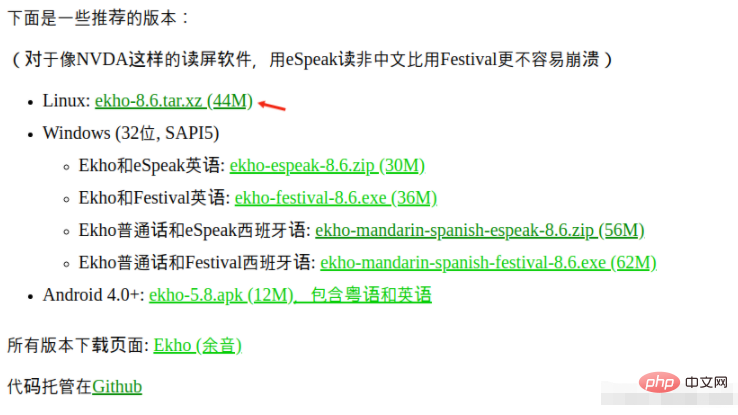Can tts be used in linux?
Can. In Linux, you can use the Ekho software to implement the TTS (text-to-speech) function; you only need to download and install the Ekho software, and you can use the ekho command to convert text to speech, with the syntax "ekho "text"". Ekho is a free, open source Chinese speech synthesis software that supports Linux, Windows and Android platforms.

The operating environment of this tutorial: linux7.3 system, Ekho 8.6, Dell G3 computer.
Linux system implements TTS (text to speech) function
In the process of user interaction software development, voice prompt requirements are often encountered. Voice prompts are a relatively direct way of interaction and can effectively improve user experience. Currently, the more common solutions include Baidu Voice Platform and iFlytek Voice Platform. These platforms generally call online services through APIs. The advantage is that the converted voice is relatively accurate, pronounced by real people, and there are a variety of voice package options. The disadvantage is that it relies on the Internet, cannot be used when the network is disconnected, requires a fee, and has a limit on the number of uses. Of course, you can choose offline SDK development for these platforms. Different platforms provide different SDK platforms. There is currently no support for the embedded arm platform. Of course, if the voice prompts are relatively few and relatively fixed, it is also a simple and fast solution to record the voice first and play the voice file directly when using it.
For the embedded arm platform, the Linux system is used. When there is no network and the voice prompt is uncertain, the TTS engine can only be used to solve the problem. After many searches, I finally found an open source Chinese TTS software Ekho (Yuyin) that is more suitable.
Ekho (Yuyin) is a free, open source Chinese speech synthesis software. It currently supports Cantonese, Mandarin (Mandarin), Guangdong Taishan dialect, Zhao'an Hakka, Tibetan, Yayan (the lingua franca of ancient China) and Korean (under trial), and English is implemented indirectly through eSpeak or Festival. Ekho supports Linux, Windows and Android platforms.
Ekho download address: http://www.eguidedog.net/cn/ekho_cn.php
3.1 Download Ekho

##3.2 Installation Ekho
First install the third-party dependency files. Note that the latest version of ekho relies on the espeak-ng library instead of espeak, which has stopped maintenance.sudo apt-get install espeak-ng libespeak-ng-dev libsndfile1-dev libpulse-dev libncurses5-dev libestools-dev festival-dev libvorbis-dev libmp3lame-dev libdotconf-dev texinfo pulseaudio libpulse-ocaml-dev
3.3 Compile and installtar xJvf ekho-xxx.tar.xz
Copy after login
cd ekho-xxx
Copy after login
./configure
Copy after login
make -j4
Copy after login
sudo make install
Copy after login
Note: Please replace xxx with the specific file path.
##Directly generate voice playbacktar xJvf ekho-xxx.tar.xz
cd ekho-xxx
./configure
make -j4
sudo make install
ekho "你好呀"
pulseaudio -start
Execute ekho "Hello!" again, and you will hear a mechanical voice.
Generate voice filesekho "你好。请继续保持努力!" -o holdon.wav
pulseaudio --start --log-target=syslog
in /etc/rc.local Add
pulseaudio --start --log-target=syslog to the file to set it to start automatically every time you turn on the computer. Related recommendations: "
The above is the detailed content of Can tts be used in linux?. For more information, please follow other related articles on the PHP Chinese website!

Hot AI Tools

Undresser.AI Undress
AI-powered app for creating realistic nude photos

AI Clothes Remover
Online AI tool for removing clothes from photos.

Undress AI Tool
Undress images for free

Clothoff.io
AI clothes remover

Video Face Swap
Swap faces in any video effortlessly with our completely free AI face swap tool!

Hot Article

Hot Tools

Notepad++7.3.1
Easy-to-use and free code editor

SublimeText3 Chinese version
Chinese version, very easy to use

Zend Studio 13.0.1
Powerful PHP integrated development environment

Dreamweaver CS6
Visual web development tools

SublimeText3 Mac version
God-level code editing software (SublimeText3)

Hot Topics
 1660
1660
 14
14
 1417
1417
 52
52
 1311
1311
 25
25
 1261
1261
 29
29
 1234
1234
 24
24
 Linux Architecture: Unveiling the 5 Basic Components
Apr 20, 2025 am 12:04 AM
Linux Architecture: Unveiling the 5 Basic Components
Apr 20, 2025 am 12:04 AM
The five basic components of the Linux system are: 1. Kernel, 2. System library, 3. System utilities, 4. Graphical user interface, 5. Applications. The kernel manages hardware resources, the system library provides precompiled functions, system utilities are used for system management, the GUI provides visual interaction, and applications use these components to implement functions.
 vscode terminal usage tutorial
Apr 15, 2025 pm 10:09 PM
vscode terminal usage tutorial
Apr 15, 2025 pm 10:09 PM
vscode built-in terminal is a development tool that allows running commands and scripts within the editor to simplify the development process. How to use vscode terminal: Open the terminal with the shortcut key (Ctrl/Cmd). Enter a command or run the script. Use hotkeys (such as Ctrl L to clear the terminal). Change the working directory (such as the cd command). Advanced features include debug mode, automatic code snippet completion, and interactive command history.
 How to check the warehouse address of git
Apr 17, 2025 pm 01:54 PM
How to check the warehouse address of git
Apr 17, 2025 pm 01:54 PM
To view the Git repository address, perform the following steps: 1. Open the command line and navigate to the repository directory; 2. Run the "git remote -v" command; 3. View the repository name in the output and its corresponding address.
 Where to write code in vscode
Apr 15, 2025 pm 09:54 PM
Where to write code in vscode
Apr 15, 2025 pm 09:54 PM
Writing code in Visual Studio Code (VSCode) is simple and easy to use. Just install VSCode, create a project, select a language, create a file, write code, save and run it. The advantages of VSCode include cross-platform, free and open source, powerful features, rich extensions, and lightweight and fast.
 vscode terminal command cannot be used
Apr 15, 2025 pm 10:03 PM
vscode terminal command cannot be used
Apr 15, 2025 pm 10:03 PM
Causes and solutions for the VS Code terminal commands not available: The necessary tools are not installed (Windows: WSL; macOS: Xcode command line tools) Path configuration is wrong (add executable files to PATH environment variables) Permission issues (run VS Code as administrator) Firewall or proxy restrictions (check settings, unrestrictions) Terminal settings are incorrect (enable use of external terminals) VS Code installation is corrupt (reinstall or update) Terminal configuration is incompatible (try different terminal types or commands) Specific environment variables are missing (set necessary environment variables)
 vscode Previous Next Shortcut Key
Apr 15, 2025 pm 10:51 PM
vscode Previous Next Shortcut Key
Apr 15, 2025 pm 10:51 PM
VS Code One-step/Next step shortcut key usage: One-step (backward): Windows/Linux: Ctrl ←; macOS: Cmd ←Next step (forward): Windows/Linux: Ctrl →; macOS: Cmd →
 What is the main purpose of Linux?
Apr 16, 2025 am 12:19 AM
What is the main purpose of Linux?
Apr 16, 2025 am 12:19 AM
The main uses of Linux include: 1. Server operating system, 2. Embedded system, 3. Desktop operating system, 4. Development and testing environment. Linux excels in these areas, providing stability, security and efficient development tools.
 How to run sublime after writing the code
Apr 16, 2025 am 08:51 AM
How to run sublime after writing the code
Apr 16, 2025 am 08:51 AM
There are six ways to run code in Sublime: through hotkeys, menus, build systems, command lines, set default build systems, and custom build commands, and run individual files/projects by right-clicking on projects/files. The build system availability depends on the installation of Sublime Text.




